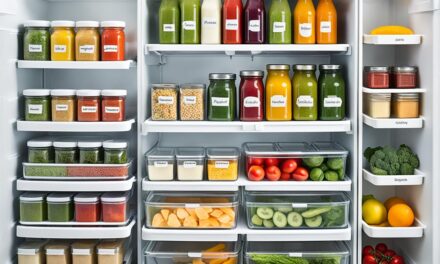Imagine this – it’s a Saturday night, and you’re curled up on the couch, binge-watching your favorite TV series. The episodes keep flowing, and so does the snacking. Bowl after bowl of crunchy, salty goodness disappears as you lose yourself in the storyline. It’s a bad food habit, or so you’ve been told.
But what if I told you that this very habit could hold the key to sustainable weight loss?
You see, when it comes to maintaining a healthy weight, it’s not just about counting calories or following strict diet plans. It’s about understanding the role of your habits and making them work for you.
Key Takeaways:
- Your eating habits play a significant role in weight control.
- Certain foods and eating patterns can make it easier to keep calorie intake in check and promote weight loss.
- The quality and food sources of macronutrients, such as fats and proteins, impact weight.
- Incorporating whole grains, vegetables, fruits, nuts, and lean proteins into your diet can aid in weight loss.
- Avoiding refined grains and sugary drinks can help prevent weight gain and chronic diseases.
Macronutrients and Weight: Do Carbs, Protein, or Fat Matter?
When it comes to weight loss, it’s easy to get caught up in the macronutrient debate—do carbs make you gain weight? Does protein help with fat loss? And what about fat itself? The truth is, the percentage of calories from carbohydrates, protein, and fat in your diet may not matter as much as you think.
In controlled studies, researchers have found that the composition of macronutrients doesn’t significantly affect weight loss. Instead, it’s the quality and food sources of these nutrients that play a bigger role in weight control. So, let’s dig deeper into the role of each macronutrient:
Carbohydrates:
“Carbs make you gain weight!”
Carbohydrates have long been vilified in the weight loss world, but their impact on weight is not as simple as it seems. While it’s true that consuming excessive refined carbohydrates like white bread and sugary snacks can contribute to weight gain, not all carbs are created equal.
In fact, including whole grains like brown rice, quinoa, and oats in your diet can provide essential nutrients and fiber while keeping you feeling satisfied. These complex carbohydrates release energy slowly, preventing blood sugar spikes and promoting better weight control.
So, instead of demonizing all carbs, focus on incorporating whole, unprocessed sources into your meals and snacks.
Protein:
“Does protein really help with weight loss?”
Protein is a macronutrient that has been touted for its weight loss benefits. And there’s some truth to it! Protein has a higher satiety effect, which means it can help you feel fuller for longer. As a result, you may be less inclined to overeat or snack on unhealthy foods throughout the day.
Additionally, protein has a higher thermic effect of food (TEF) compared to carbohydrates and fat. This means that your body burns more calories digesting and metabolizing protein. So, including protein-rich foods like lean meats, poultry, fish, tofu, and legumes in your meals can give your metabolism a small boost.
Moreover, protein plays a crucial role in preserving lean muscle mass during weight loss. When you lose weight, you want to shed fat, not muscle. By consuming an adequate amount of protein, you can help maintain your muscle mass and ensure that you’re losing fat rather than valuable lean tissue.
Fat:
“But won’t eating fat make me fat?”
The relationship between dietary fat and body fat isn’t as straightforward as it may seem. Contrary to popular belief, low-fat diets are not necessarily more effective for weight loss. In fact, research suggests that the type of fat you consume may have a more significant impact on weight control.
Saturated and trans fats, often found in processed and fried foods, are associated with increased weight gain and a higher risk of chronic diseases. On the other hand, unsaturated fats, like those found in avocados, nuts, and olive oil, are considered healthier options that can support weight control and overall well-being.
So, rather than focusing on eliminating all fat from your diet, opt for healthier sources and moderate your intake.
While macronutrients are essential for a balanced diet, it’s important to remember that weight control is not solely about their composition. Incorporating a variety of whole foods, practicing portion control, and maintaining an active lifestyle are crucial for achieving and maintaining a healthy weight.
So, the next time you find yourself caught up in the macronutrient debate, remember that quality and balance are key. Instead of obsessing over one specific macronutrient, focus on creating a well-rounded and sustainable eating plan that suits your individual needs and preferences.
Specific Foods that Make It Easier or Harder to Control Weight
When it comes to weight control, not all foods are created equal. Some can be your best allies in achieving your weight loss goals, while others can sabotage your efforts. Let’s take a closer look at the specific foods that can make it easier or harder for you to control your weight.
Whole Grains: The Gentle Blood Sugar Stabilizers
Whole grains, such as whole wheat, brown rice, and barley, are superheroes when it comes to weight control. Unlike refined grains that can cause blood sugar spikes and subsequent crashes, whole grains are digested more slowly. This gentle digestion process helps stabilize blood sugar and insulin levels, making it easier for you to maintain a healthy weight.
Fruits and Vegetables: Nature’s Weight Loss Buddies
It’s no secret that fruits and vegetables are essential for overall health. But did you know that they can also play a crucial role in weight control? Whole fruits and vegetables are packed with essential nutrients, fiber, and water, which can help keep you feeling full and satisfied. Plus, their natural sweetness can satisfy your cravings for something sweet without derailing your weight loss efforts.
Nuts: The Surprising Weight Control Wonders
Despite being calorie-dense, nuts can actually aid in weight control. How? Well, these little powerhouses are rich in protein and fiber, both of which promote satiety and help control cravings. Including a handful of nuts in your diet can keep you feeling satisfied for longer, preventing overeating and supporting your weight loss journey.
Refined Grains and Sugary Drinks: Weight Gain Culprits
On the flip side, foods high in refined grains, such as white bread, white rice, and sugary drinks, can contribute to weight gain. These refined carbohydrates lack the fiber present in whole grains and can cause blood sugar spikes, leading to increased hunger and cravings. Limiting your intake of these foods can help you maintain a healthy weight and reduce the risk of chronic diseases.
| Foods that Make Weight Control Easier | Foods that Make Weight Control Harder |
|---|---|
| Whole grains (whole wheat, brown rice, barley) | Refined grains (white bread, white rice) |
| Fruits and vegetables | Sugary drinks |
| Nuts |
Remember, weight control isn’t just about counting calories. It’s about nourishing your body with the right foods that support your overall health and help you maintain a healthy weight. Incorporate whole grains, fruits, vegetables, and nuts into your diet while reducing your intake of refined grains and sugary drinks for effective weight control.
How Habits Influence Weight Loss Maintenance
When it comes to weight loss maintenance, habits play a powerful role. Habits are automatic behaviors triggered by contextual cues, and by forming healthy habits, you can sustain behavior change and make long-term weight loss more achievable.
Habit-based interventions have shown promising results in both sustaining weight loss and changing behavior. These interventions focus on breaking unhealthy habits and forming new healthy habits related to diet and lifestyle. By incorporating habit-focused strategies into weight loss maintenance programs, you can increase your chances of successfully maintaining your weight loss.
Developing healthy habits is crucial because they shift the focus from conscious decision-making to automaticity. Once a behavior becomes a habit, it requires less effort and willpower, making it easier to stick to your weight loss goals. For example, if you establish a habit of daily exercise, it eventually becomes second nature, and you won’t have to rely on motivation alone to stay active.
“Motivation is what gets you started. Habit is what keeps you going.” – Jim Ryun
Utilizing habit-based strategies in weight loss maintenance allows for long-term success. By identifying and replacing unhealthy habits with healthier alternatives, you can create a supportive environment that facilitates sustained weight loss. This approach focuses on the psychology of behavior change and recognizes that habits are foundational to achieving lasting results.
Promising Habit-Focused Strategies for Weight Loss Maintenance
Here are some habit-focused strategies you can incorporate into your weight loss maintenance plan:
- Start small: Focus on one habit at a time, gradually building momentum as you succeed.
- Create cues: Use environmental triggers to prompt desired behaviors. For example, place your workout clothes by the bed to prompt morning exercise.
- Track progress: Monitor your habits and celebrate milestones to reinforce positive behavior change.
- Find accountability: Join a supportive group or enlist a friend to help you stay on track and encourage habit formation.
- Celebrate successes: Reward yourself for reaching milestones and achieving your weight loss maintenance goals.
By implementing these habit-focused strategies, you can create a solid foundation for sustained weight loss. Remember, habits are built over time and require consistent effort, but the payoff is worth it.
| Strategy | Description |
|---|---|
| Start small | Focus on one habit at a time to build momentum and increase the likelihood of success. |
| Create cues | Use triggers in your environment to prompt desired behaviors, making it easier to maintain healthy habits. |
| Track progress | Monitor your habits and progress, celebrating milestones and reinforcing positive behavior change. |
| Find accountability | Join a supportive group or find a friend who can help you stay accountable and provide encouragement. |
| Celebrate successes | Reward yourself for reaching milestones and achieving your weight loss maintenance goals, keeping motivation high. |
Overcoming Unhealthy Eating Habits: Strategies for Success
Successfully breaking unhealthy eating habits requires a gradual approach and understanding the underlying reasons behind these habits. Instead of calling it a “diet,” reframing habits as self-care can be helpful. When you prioritize self-care, you’re more likely to make choices that support your overall well-being.
Start by uncovering the motives behind your unhealthy habits. Are you using food as a coping mechanism? Are you eating out of boredom or stress? By addressing the root cause of your habits, you can begin to make meaningful changes.
Setting realistic goals is crucial when it comes to behavior change. Don’t expect overnight transformations. Focus on making small, gradual changes that are sustainable in the long run. Celebrate your progress along the way, no matter how small!
Instead of restricting yourself from certain foods, try adding healthy foods to your diet. By filling up on nutritious options such as fruits, vegetables, whole grains, and lean proteins, you’ll naturally crowd out unhealthy choices.
Remember, nobody is perfect, and slip-ups are bound to happen. Be gentle with yourself and practice self-compassion. If you indulge in a less healthy meal or snack, don’t beat yourself up. Instead, get back on track the next day and continue your journey towards healthier habits.
But let’s not forget the power of self-care in overcoming unhealthy eating habits. Take the time to nourish your body and mind. Prioritize activities that bring you joy, reduce stress, and promote overall well-being. When you prioritize self-care, you’re more likely to make choices aligned with your goals.
Remember, it’s not about perfection, it’s about progress. And progress comes from consistent effort and self-care.
Strategies for Success:
- Reframe habits as self-care
- Uncover the motives behind unhealthy habits
- Set realistic goals
- Add healthy foods to your diet
- Practice self-compassion
Self-Care Activities:
| Activity | Benefits |
|---|---|
| Yoga | Improves flexibility and reduces stress |
| Meditation | Promotes mindfulness and emotional well-being |
| Journaling | Helps identify triggers and emotions related to unhealthy habits |
| Spending time in nature | Reduces stress and improves mood |
Strategies for Sustainable Weight Loss
When it comes to achieving sustainable weight loss, it’s all about making gradual changes and focusing on long-term behavior change. Forget about quick fixes and crash diets, because they rarely lead to lasting results. Instead, embrace a mindset of self-compassion, habit formation, and realistic expectations.
One of the key strategies for sustainable weight loss is managing your expectations. Understand that weight loss is a journey, and it takes time to see significant changes. Set realistic goals that are achievable and sustainable in the long run. By setting small milestones along the way, you’ll keep yourself motivated and celebrate each step towards your ultimate weight loss goal.
Another crucial factor in sustainable weight loss is prioritizing your overall well-being. Remember that weight loss is not just about shedding pounds; it’s about improving your health, both physically and mentally. Focus on adopting healthy habits that nourish your body and mind. Incorporate regular exercise, prioritize sleep, and practice stress management techniques like meditation or yoga. By taking care of your overall well-being, you’ll not only lose weight but also feel happier and more fulfilled.
Practicing self-compassion is essential during your weight loss journey. Accept that setbacks and mistakes are part of the process. Instead of beating yourself up over slip-ups, learn from them and use them as opportunities for growth. Remember, sustainable weight loss is about progress, not perfection. Be kind to yourself, and don’t let setbacks derail your entire journey. Get back on track with renewed motivation and determination.
| Habit-based Strategies for Sustainable Weight Loss | Description |
|---|---|
| Identify Triggers | Recognize the situations, emotions, or behaviors that trigger unhealthy eating habits. Once you identify these triggers, you can implement strategies to avoid or cope with them effectively. |
| Form Healthy Habits | Replace unhealthy habits with new, positive ones. Focus on incorporating simple changes into your daily routine, such as drinking more water, eating more vegetables, or going for a daily walk. |
| Supportive Environment | Create an environment that supports your weight loss goals. Surround yourself with people who are also on a health journey or seek the guidance of a supportive community. |
| Reward System | Create a reward system to celebrate your milestones and achievements along the way. This can be as simple as treating yourself to a spa day or buying yourself a small gift. |
Remember, sustainable weight loss is not about temporary changes or quick fixes. It’s about making lasting lifestyle changes that become second nature. Embrace the power of gradual changes, behavior change, self-compassion, and habit formation. By implementing these strategies, you’ll not only achieve your weight loss goals but also maintain them for years to come.
Sticking to a New Diet: Strategies for Long-Term Success
So, you’ve decided to embark on a new diet and make positive changes to your lifestyle. Congratulations! But we all know that sticking to a new diet can be challenging, especially in the long run. Don’t worry, though, because we’ve got you covered with some fantastic strategies that will help you achieve long-term success.
Develop Self-Awareness: One of the first steps to success is self-awareness. Pay attention to your eating habits, emotions, and triggers. Are there certain situations or moods that often lead to unhealthy food choices? By recognizing these patterns, you can take proactive steps to avoid them and stay on track.
Practice Consistent Habits: Habits are the building blocks of sustainable change. Start by incorporating small, healthy habits into your daily routine. Whether it’s drinking more water, including more vegetables in your meals, or keeping a food journal, consistency is key. With time, these habits will become second nature and contribute to your long-term success.
“The secret of change is to focus all of your energy not on fighting the old, but on building the new.” – Socrates
Embrace Imperfection: Remember, progress is not always linear, and slip-ups are a part of the journey. If you veer off track one day, don’t beat yourself up over it. Instead, practice self-compassion and get back on track the next day. It’s the overall consistency that matters, not perfection.
| Strategies for Long-Term Success: |
|---|
| Develop self-awareness |
| Practice consistent habits |
| Embrace imperfection |
Focus on the Journey: Instead of fixating solely on the end goal, enjoy the process. Celebrate small victories along the way and acknowledge how far you’ve come. This shift in perspective can make the journey more enjoyable and sustainable.
Now that you’ve armed yourself with these strategies, it’s time to put them into practice. Sticking to a new diet is all about behavior change, habit formation, and self-awareness. With consistent practice and a positive mindset, you’ll be well on your way to achieving long-term success.
Conclusion
So, you’ve reached the end of this insightful journey into sustainable weight loss maintenance. Congratulations on gaining a deeper understanding of how forming sustainable habits can be the secret to long-term success!
By recognizing the impact of specific foods, macronutrients, and habits on weight control, you now have the power to make informed choices that align with your weight loss goals. Remember, it’s not about deprivation or quick fixes, but about making gradual changes that promote a healthier lifestyle.
As you embark on your weight loss journey, prioritize self-compassion and overall well-being. Be kind to yourself, accept slip-ups as part of the process, and get back on track with renewed determination. By incorporating habit-based strategies and practicing self-awareness, you can build new healthy habits that contribute to maintaining your weight loss in the long run.
So go forth, armed with your newfound knowledge and determination. Make sustainable habits your steadfast companions on this transformative journey towards a healthier, happier you!
FAQ
Is there a “bad” food habit that can actually help with sustainable weight loss?
Do the types of macronutrients in my diet matter for weight loss?
Are there specific foods that can help with weight control?
How do habits influence weight loss maintenance?
What strategies can help me overcome unhealthy eating habits?
What strategies can support sustainable weight loss?
How can I stick to a new diet for long-term success?
MORE SOURCES TO READ:
- https://www.hsph.harvard.edu/obesity-prevention-source/obesity-causes/diet-and-weight/
- https://www.businessinsider.com/guides/health/diet-nutrition/how-to-change-diet-habits
- https://research.bond.edu.au/files/26951849/Could_habits_hold_the_key_to_weight_loss_maintenance.pdf
![]()














Recent Comments